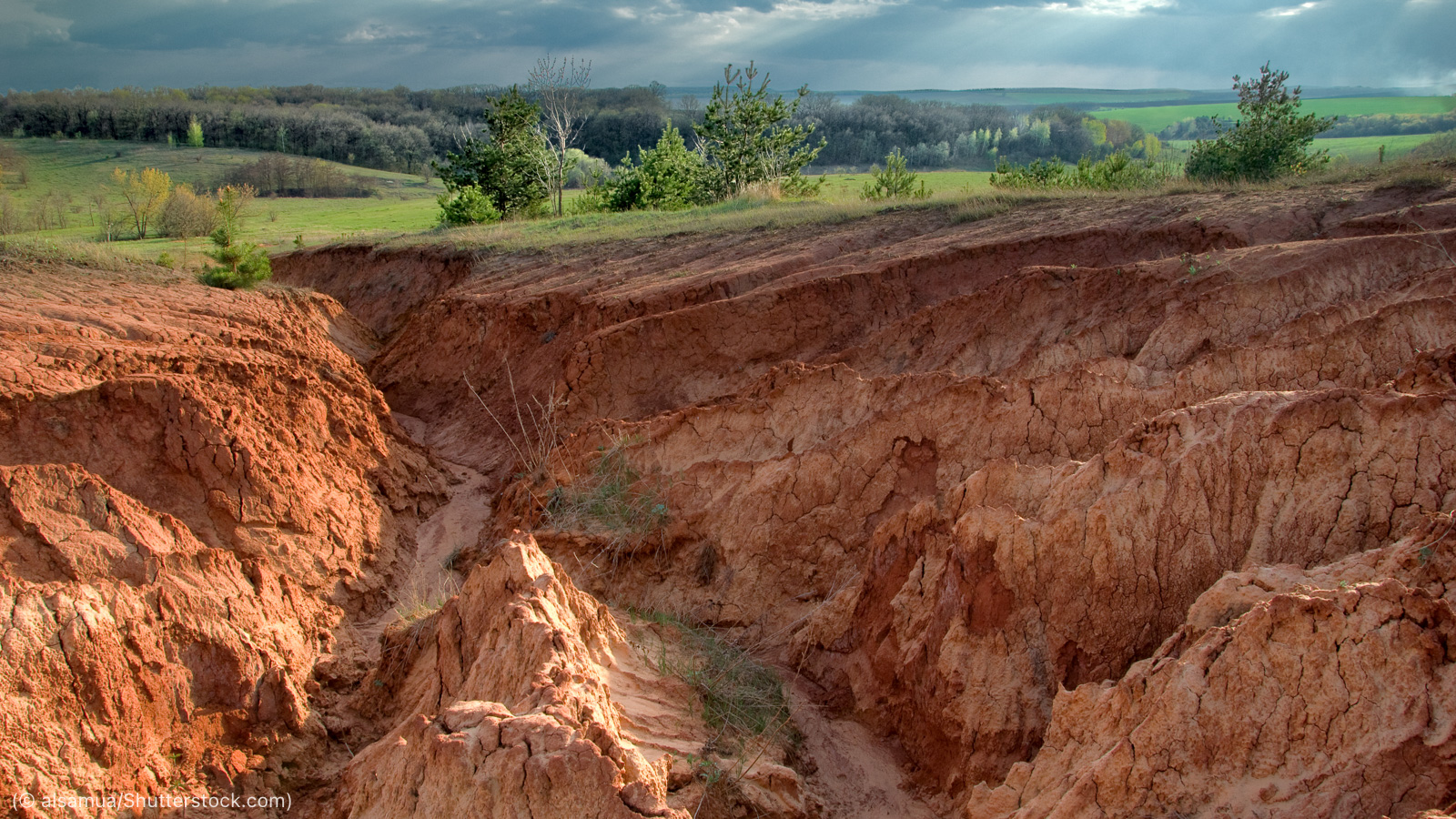ASTANA – In Kazakhstan, 90 million hectares of land are affected by degradation, demanding urgent action, according to experts at an international conference organized by the United Nations’ Food and Agriculture Organization (FAO) in Kazakhstan and the Global Environment Facility (GEF), with the support of the Kazakh Ministries of Agriculture and Ecology and Natural Resources on Dec. 19 in Astana, reported FAO press service.

Erosion of the land in the steppe zone. Photo credit: Shutterstock.com
“To date, some 33% of the country’s territory, around 90 million hectares, is subject to various forms of land degradation. At the same time, 29 million hectares of land are already suffering from erosion, which significantly reduces their fertility and limits opportunities for effective agriculture,” said Alisher Baiseitov, chief expert of the Committee of Land Administration of the Kazakh Ministry of Agriculture.
Kazakhstan, as a country with developed livestock production, faces the problem of pasture degradation.
“According to long-term data of geobotanical surveys, the unsatisfactory situation with the quality of pasture lands is characteristic for the most part of the country’s territory. The area of degraded pasture lands amounts to 27.1 million hectares, which is around 15% of the total pasture area,” said Baiseitov.

Experts proposed a number of recommendations to prevent the land degradation from worsening. Photo credit: FAO in Kazakhstan
Kazakhstan introduced legislative initiatives, including the law on soil protection, in 2024. The draft law provides for more effective mechanisms and measures to hold land users liable for land pollution.
“The impact of pesticides and chemical fertilizers on our soils is poorly regulated, while we rely heavily on imports, with 90% of fertilizers coming from abroad. It is necessary to establish proper oversight to prevent further soil degradation. Soil fertility is declining across the board, which will inevitably result in lower yields, despite the widespread use of mineral fertilizers. However, relying solely on chemical solutions will not be enough to restore soil fertility or improve the quality of agricultural products,” said Mazhilis (lower house of Parliament) deputy Nurzhan Ashimbetov.
Coordinator of the United Nations Convention to Combat Desertification (UNCCD) in Kazakhstan and Deputy Head of Giprozem Land Survey State Institute Aidos Abdrakhmanov said that Kazakhstan and FAO are implementing projects to restore degraded lands, introducing drought-resistant technologies and improving soil management practices.
Since 2022, FAO, GEF and relevant ministries have been implementing Lifecycle Management of Pesticides and Disposal of POPs Pesticides in Central Asian countries and Türkiye project in Kazakhstan. The project included a national inventory of obsolete pesticides and an environmental assessment of contaminated sites in several regions. Bio and phytoremediation trials were also conducted on contaminated sites to remediate and return the land to agricultural use.
FAO experiments proved that, through integrated pest management (IPM), Kazakh farmers can reduce their use of pesticides by 70-80% and grow environmentally friendly products without additional costs or reduced yields.
Soil condition is also important in biodiversity conservation, said Anar Sarsenova, head of the Department of Historical Waste Management of Zhasyl Damu, a subordinate organization of the Kazakh Ministry of Ecology and Natural Resources.
“Soil plays a key role in biodiversity conservation, water filtration and carbon sequestration, making it an important element in the fight against climate change. However, today we must look much more broadly at soil health, given the environmental threats such as pollution and degradation caused by, among other things, waste accumulation, hazardous waste dumps, as well as agricultural plastics and other anthropogenic factors,” said Sarsenova.
